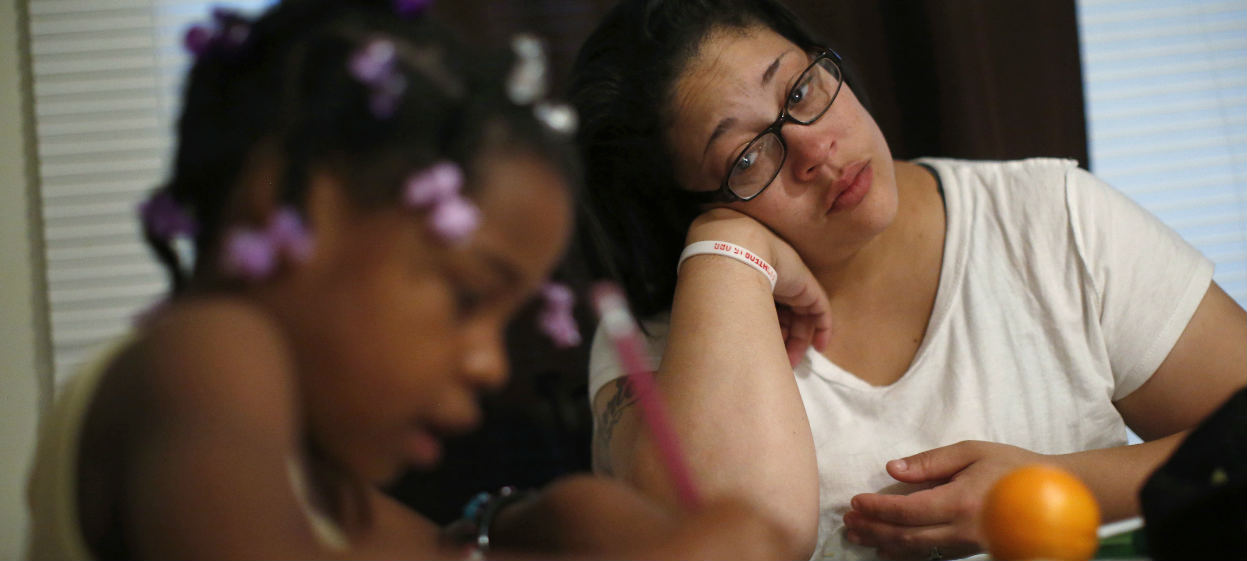Story Highlights
- Nearly two in three parents back national education standards
- Smaller majorities support testing and teacher evaluations
- Republicans/GOP leaners less likely to see standards positively
This article is part of a series on parents' and teachers' attitudes about the Common Core State Standards.
WASHINGTON, D.C. -- Parents of U.S. public school students in grades K-12 are about evenly divided over the Common Core State Standards. Thirty-five percent view them negatively and 33% view them positively, while another third aren't familiar with them or don't have an opinion. This reflects a slight shift since April, when parents were slightly more positive (35%) than negative (28%).
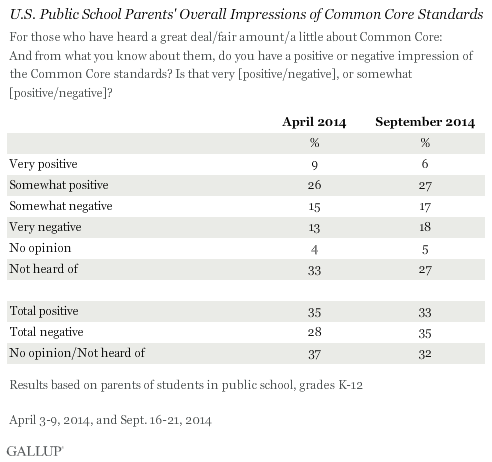
The overall proportion of public school parents who report having heard at least a little about the new standards has not changed appreciably since April, now at 73%. However, nearly half (49%) of public school parents now say they have heard a great deal or fair amount about the new standards, up from 38% in April.
The data suggest that this increase in awareness has led to an increase in negativity, given the seven-percentage-point increase in those viewing the standards negatively and the two-point decrease in those viewing them positively.
The April and September Gallup polls gauged public school parents' general reactions to the Common Core standards. A Phi Delta Kappa/Gallup poll on Common Core conducted in May and June elicited views about the standards that were more negative, although the questions were worded differently. That survey found 29% of public school parents in favor of "having teachers in your community use the Common Core State Standards to guide what they teach" and 57% opposed to that, with 6% unsure and 8% completely unfamiliar with Common Core. The majority opposition found with that measure could reflect parents' concern about the standards limiting teachers' flexibility in the classroom.
Support for Standards, Testing Has Waned
Though most public school parents still support the three key components of Common Core -- the curriculum standards, the student testing, and using student test scores to evaluate teachers -- support for the curriculum standards and student testing has declined since April, consistent with the more negative views of the standards overall.
Today, 65% of public school parents view having one set of national educational standards for reading, writing and math positively, but this is down from 73% in April. About six in 10 currently view standardized computer-based testing of students positively, as well as linking teacher evaluations to their students' Common Core test scores. Closer to two-thirds of parents favored both of these elements in April.
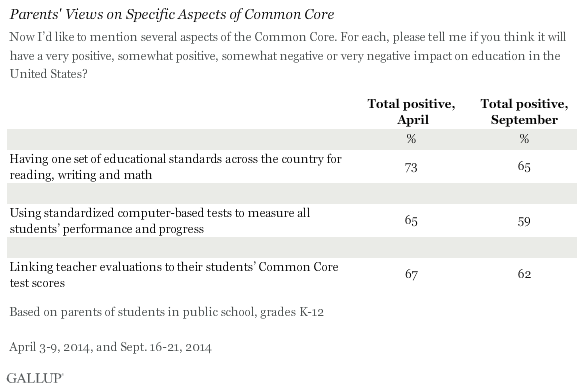
Opposition to Common Core Solidifies Among Parents Who Lean Republican
Today, as in April, public school parents who identify with or lean toward the Democratic Party are more supportive than Republicans of Common Core. However, as both groups have grown slightly more aware of the program, the balance of Republicans' views has become much more negative, while Democrats' views have stayed about the same.
The majority of Republican parents -- 58% -- now hold a negative view of Common Core, up from 42% in April, and leaving just 19% viewing it positively. Additionally, significantly more Republicans now have a very negative view of Common Core than a somewhat negative view, 35% vs. 23%.
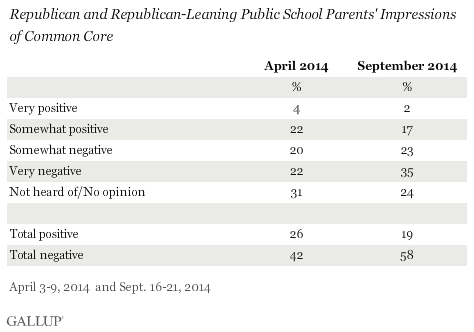
Meanwhile, Democratic parents remain in favor of Common Core by about 2-to-1, with 48% viewing it positively and 23% negatively, similar to their views in April. However, unlike Republican opposition, which is relatively strong, Democrats' support is tepid, with most supporters saying they have a somewhat rather than a very positive view of it, 37% vs. 11%.
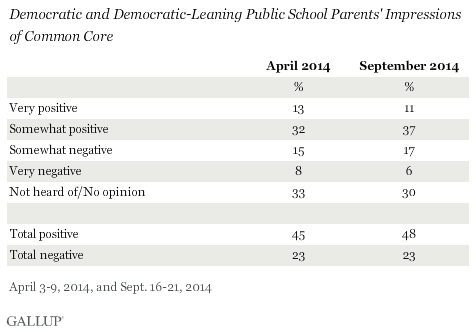
Bottom Line
At least a year into its implementation in most states, the Common Core State Standards initiative has received a great deal of discussion, review and pushback -- with Indiana and Oklahoma becoming the first states to drop the math and reading standards through legislation, bringing the number of states that are not participating to seven.
This might not be the end of major opposition among the states. Common Core has been an issue in many of the gubernatorial elections taking place this November, the outcomes of which could affect how the standards are implemented -- if at all. In New York and Connecticut, the rollout of Common Core has become an issue for the Democratic governors who supported it, and has given some ammunition to their Republican challengers who oppose the initiative.
In Florida, meanwhile, Republican Gov. Rick Scott has said he is opposed to Common Core but has received flak for not waging political war on the initiative. His stance is further complicated by former Republican Gov. Jeb Bush's support for the standards -- a rogue stance for a prospective 2016 GOP presidential candidate. In some states, an attempt to repeal Common Core is underway -- such as Pennsylvania, where vulnerable Republican Gov. Tom Corbett has reversed his support for the initiative.
While parents' attitudes about Common Core have soured a bit since April, most of that shift comes from solidifying opposition among Republicans. This likely means that leaders in Republican states will continue to feel grassroots pressure to resist the standards, even if implementation proceeds apace elsewhere. However, without a larger proportion of Democratic parents backing the initiative, it's conceivable that serious repeal efforts could take hold anywhere.
Survey Methods
Results for this poll are based on telephone interviews conducted Sept. 16-17, 2014, on Gallup Daily tracking, with a random sample of 532 public school K-12 parents, aged 18 and older, living in all 50 U.S. states and the District of Columbia.
For results based on the total sample of public school parents, the margin of sampling error is ±6 percentage points at the 95% confidence level.
Each sample of national adults includes a minimum quota of 50% cellphone respondents and 50% landline respondents, with additional minimum quotas by time zone within region. Landline and cellular telephone numbers are selected using random-digit-dial methods.
View survey methodology, complete question responses, and trends.
Learn more about the Gallup Daily tracking methodology.
